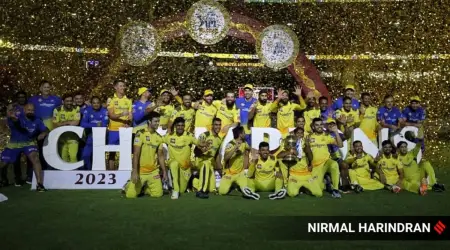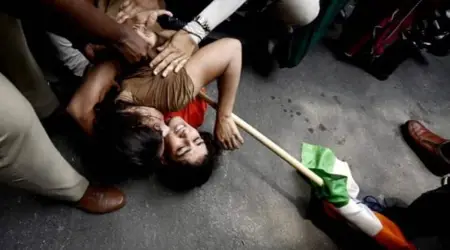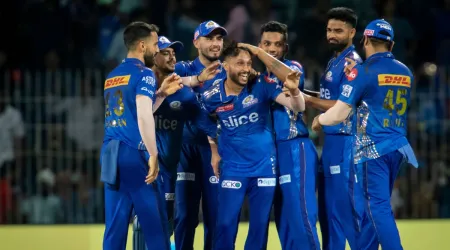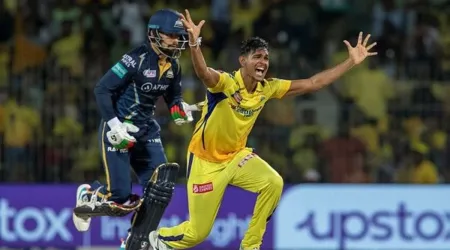Away from Jantar Mantar, in village of Phogat sisters, anger, apprehension
‘Many parents enrolled their girls in wrestling after seeing the movie Dangal. I comfort these parents by saying that wrestlers will get justice,’ says Mahavir Phogat, father of international wrestlers Geeta and Babita
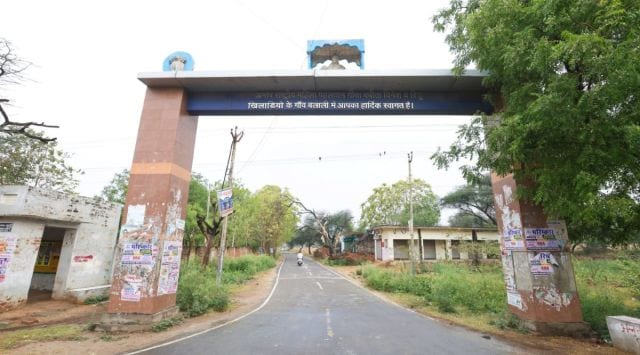 The arch at the entrance of Balali village with the wordings 'Welcome to Balali village, the home of international wrestlers Geeta, Babita, Vinesh and Ritu'. (EXPRESS PHOTO by Gajendra Yadav)
The arch at the entrance of Balali village with the wordings 'Welcome to Balali village, the home of international wrestlers Geeta, Babita, Vinesh and Ritu'. (EXPRESS PHOTO by Gajendra Yadav) Balali/Jhojhu Kalan: The wonky GPS can be switched off at the village-entrance-arch that has an idol of Hanuman at the very top. The letters on the blue background give away the ‘current location’ — ‘Welcome to Balali village, the home of international wrestlers Geeta, Babita, Vinesh and Ritu’. Houses emerge a few hundred metres ahead on an untarred road, muddier this week following the unseasonal rain.
People here are eager to point to the must-see spots in and around Balali, a village in the Charkhi Dadri district of Haryana — the area where famed wrestling coach Mahavir Phogat dug up a mudpit for his young daughters Geeta and Babita; the now-dilapidated house of the Phogats, where Mahavir and his five brothers, their families and a dozen children stayed. A two-storey house rises over the other modest buildings – that of Vinesh Phogat, the wrestler leading the protest at Jantar Mantar.
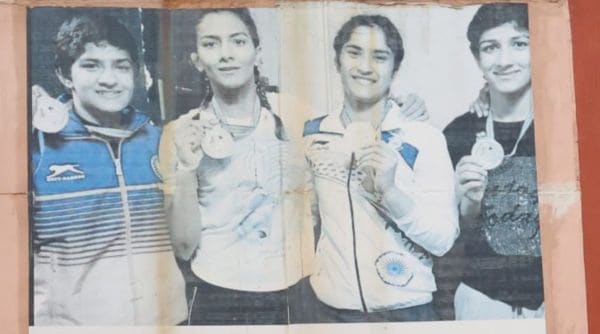 A poster of the Phogat sisters — Babita, Geeta, Vinesh and Ritu — at in Jhojhu Kalan
A poster of the Phogat sisters — Babita, Geeta, Vinesh and Ritu — at in Jhojhu Kalan
Mahavir is still an active coach and runs his academy at the Vivekanand Memorial Public School in Jhojhu Kalan village, about four kilometres from Balali. These days he is also a counsellor to anxious parents of teenage women wrestlers. Since seven women wrestlers filed separate complaints of alleged sexual harassment against Wrestling Federation of India president Brij Bhushan Sharan Singh, Mahavir says he has been receiving calls from parents wanting to pull their daughters out of wrestling.
“I just got off a call with a parent. I can understand their anxiety. Many parents enrolled their girls in wrestling after seeing the movie Dangal. I too am a father of daughters who are wrestlers. I comfort these parents by saying that the wrestlers will get justice,” Mahavir says.
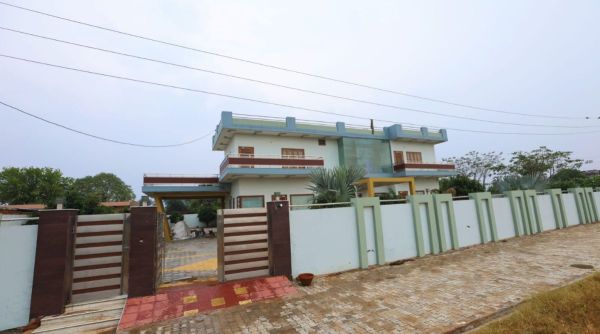 The family home of Vinesh Phogat in Balali village. (EXPRESS PHOTO by Gajendra Yadav)
The family home of Vinesh Phogat in Balali village. (EXPRESS PHOTO by Gajendra Yadav)
Mahavir put Balali on the map when his daughter Geeta became the first Indian woman to win a Commonwealth Games gold in wrestling in 2010. Regular podium finishes by the Phogat sisters and their cousin Vinesh — a two-time World Championship medalist — kept the village’s fame intact.
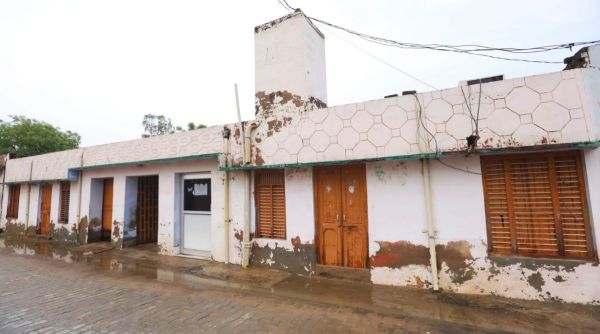 The old family home of Mahavir Phogat in Balali. Mahavir, his five brothers, families and a dozen children stayed here. (EXPRESS PHOTO by Gajendra Yadav)
The old family home of Mahavir Phogat in Balali. Mahavir, his five brothers, families and a dozen children stayed here. (EXPRESS PHOTO by Gajendra Yadav)
In the box-office hit Dangal, based on Mahavir’s life, the foot-tapping soundtrack ‘bapu sehat ke liye tu toh haanikaarak hai’ plays when actor Aamir Khan, as Mahavir, gets his two exhausted daughters to build their stamina by making them run along the fields.
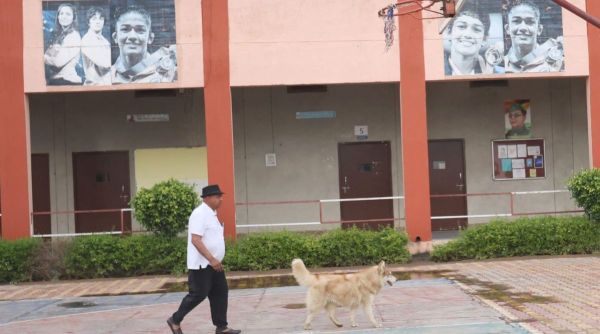 Mahavir leaves the training hall at his academy in Jhojhu Kalan, along with his pet dog. (EXPRESS PHOTO by Gajendra Yadav)
Mahavir leaves the training hall at his academy in Jhojhu Kalan, along with his pet dog. (EXPRESS PHOTO by Gajendra Yadav)
Two dogs, a German shepherd and a Husky, tail Mahavir as he walks from his one room-plus-kitchen accommodation at the entrance of the school to the indoor wrestling hall. Around the basketball court, fixed to the school building, are a dozen faded posters of the medal-winning Phogat sisters. Framed quotations by former president APJ Abdul Kalam dot the walls in the hallway leading to the training area.
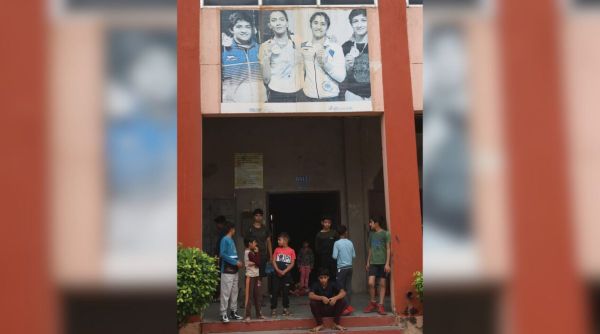 The wrestling hall at Mahavir’s academy at the Vivekanand Memorial Public School in Jhojhu Kalan. (EXPRESS PHOTO by Gajendra Yadav)
The wrestling hall at Mahavir’s academy at the Vivekanand Memorial Public School in Jhojhu Kalan. (EXPRESS PHOTO by Gajendra Yadav)
“About 15 of the 50 trainees are girls, but none from Balali now,” says Mahavir. The trainees — from Haryana, Uttar Pradesh, Rajasthan and Madhya Pradesh — quickly slip on their wrestling shoes and stop chatting when the famed coach approaches.
Among the youngest wrestlers at Mahavir’s academy are Riddhi, 8, and her brother Jaideep, 6. Riddhi’s father Manish says talking to Mahavir has helped him stay hopeful about the safety of women wrestlers.
“Will the families of girls be willing to send them for wrestling if nothing changes in the federation despite the protests?” Mahavir asks. “It was difficult for me to change perceptions of people when I started training my daughters in the village. Today if sexual harassment in the WFI is being talked about, it will have an impact on a number of women from villages who wanted to take up wrestling.”
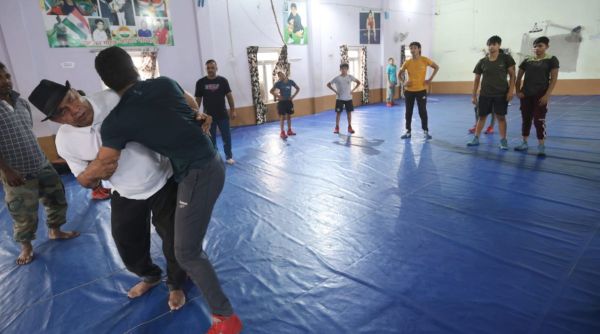 Dronacharya Award winner Mahavir Phogat during a training session at his academy in Jhojhu Kalan. (EXPRESS PHOTO by Gajendra Yadav)
Dronacharya Award winner Mahavir Phogat during a training session at his academy in Jhojhu Kalan. (EXPRESS PHOTO by Gajendra Yadav)
Balali wasn’t always a wrestling hub. Mandola, a village 20 minutes away by road, is home to a 1956 Olympian. An Asian Games and Commonwealth Games medalist from the 1970s is from nearby Samaspur. Balali is a farming village of nearly 450 households and known for its wheat, mustard and millet before the home-grown women’s wrestling revolution happened.
In Balali, there is apprehension and anger, says sarpanch Amit Kumar. He stays two houses away from where the Phogats used to live before they built a ‘kothi’. “The anger is because daughters from our village who have brought glory to the country have had to sit in protest for days at Jantar Mantar. The person who has been accused of sexual harassment is roaming freely and giving interviews while the wrestlers are sleeping on the road, being bitten by mosquitoes, and the police is not allowing them to carry food. We are worried that things will get worse for our wrestlers,” Kumar says.
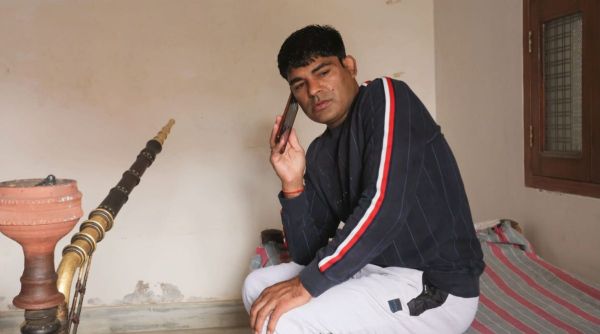 Balali village sarpanch Amit Kumar at his home. (EXPRESS PHOTO by Gajendra Yadav)
Balali village sarpanch Amit Kumar at his home. (EXPRESS PHOTO by Gajendra Yadav)
A few hours later, after seeing visuals of a late night scuffle between the wrestlers and police, Kumar wants to rush to Jantar Mantar.
Kumar is also a father to a wrestler-daughter, Neha, a junior wrestler with an international medal. “I hope the investigation is completed fast and the truth comes out,” the sarpanch says.
Since the latest round of protests, the second since January, began on April 23, representatives of 40 villages of the Sangwan Khap (a village clan) travelled to Jantar Mantar, like they did during the farmer protests. The Sangwan Khap holds sway in Balali but the wrestling family of the Phogats have the highest respect.
“Mahavir ji made Balali famous. Now we have to stand by him and the wrestlers he produced,” says Pritam Singh, a hind-kesari (Indian-style wrestling championship) regular.
In Jhojhu Kalan, as Mahavir wraps up evening training, he asks about the latest news from Jantar Mantar. “I went for half a day but I am unable to sit at the protest site for too long because of a leg-related issue. I will go again… till the wrestlers get justice.”













